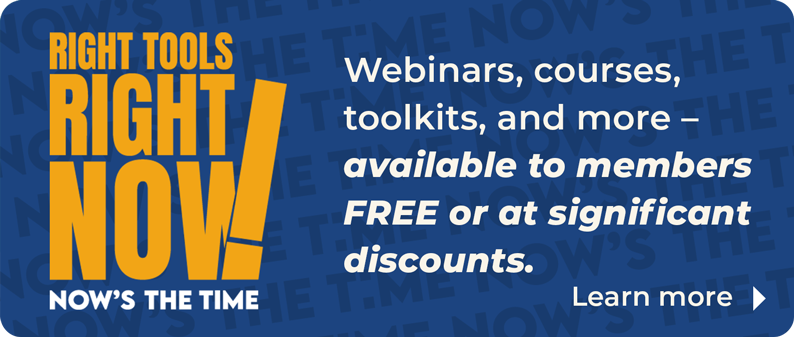Advocacy
References
NAR Library & Archives has already done the research for you. References (formerly Field Guides) offer links to articles, eBooks, websites, statistics, and more to provide a comprehensive overview of perspectives. EBSCO articles (E) are available only to NAR members and require the member's nar.realtor login.
Fair Housing Handbook, Fifth Edition—Item # 166-1084
This handbook is an excellent resource for fair housing guidance. It is the most comprehensive fair housing resource available in the industry.
Includes:
- Suggested fair housing office procedures
- Background on fair housing regulations
- Samples of the HUD
- Equal Housing Opportunity poster logo
- Equal service report forms
- Information on the NAR/HUD partnership
- Self-assessment questionnaire
Order online or call NAR's Contact Center at 1-800-874-6500.
Information From the Department of Justice
ADA Enforcement (U.S. Department of Justice)
To find cases and matters sorted by type of document (e.g., settlement agreement, brief) and listed in reverse chronology (most recent first), go to Enforcement Activities.
Federal ADA and Disability Resources (U.S. Department of Justice)
- Employment: U.S. Equal Employment Opportunity Commission
- Transportation: U.S. Department of Transportation, Federal Transit Administration
- Telephone Relay Service: Federal Communications Commission
- ADA Guidelines: U. S. Access Board
- Education: U.S. Department of Education
- Health Care: U.S. Department of Health and Human Services
- Labor: U.S. Department of Labor
- Housing: U.S. Department of Housing and Urban Development
- Parks and Recreation: U.S. Department of the Interior
- Agriculture: U.S. Department of Agriculture
How to File an Americans with Disabilities Act Complaint with the U.S. Department of Justice (U.S. Department of Justice)
If you believe that you or someone else was discriminated against based on a disability, you can file an Americans with Disabilities Act (ADA) complaint against a state government or local government, such as a public hospital, public school, other state or local government program; a private business that serves the public, such as a restaurant, doctor’s office, shop, or hotel.
Introduction to the ADA (U.S. Department of Justice)
To be protected by the ADA, one must have a disability, which is defined by the ADA as a physical or mental impairment that substantially limits one or more major life activities, a person who has a history or record of such an impairment, or a person who is perceived by others as having such an impairment. The ADA does not specifically name all of the impairments that are covered.
Frequently Asked Questions about Service Animals and the ADA (U.S. Department of Justice)
Are emotional support, therapy, comfort, or companion animals considered service animals under the ADA?
No. These terms are used to describe animals that provide comfort just by being with a person. Because they have not been trained to perform a specific job or task, they do not qualify as service animals under the ADA. However, some State or local governments have laws that allow people to take emotional support animals into public places. You may check with your State and local government agencies to find out about these laws.
Topics of Interest on ADA.gov (U.S. Department of Justice)
The process that the Department of Justice uses to certify that State laws, local building codes, or similar ordinances meet or exceed the ADA Standards for Accessible Design for new construction and alterations, go to Certification of State and Local Building Codes.
Information From NAR
Growing Accessibility Challenges (REALTOR® Magazine, Jul.-Aug. 2021)
The preponderance of Americans with disabilities who strive to live independently makes for a niche market that will only get larger. Not only will you earn a commission but you’ll get extra satisfaction by helping clients achieve their housing dream.
Visually Accessible Websites Aid ADA Compliance (REALTOR® Magazine, Jul. 31, 2020)
With most home searches beginning online, you have a duty as a real estate agent and broker to ensure your website is accessible to all. One big piece of that is readability. About 8% of the population needs web browsers’ accessibility setting, according to research cited by Eric Stegemann, CEO of Tribus, a custom brokerage platform vendor.
Americans with Disabilities Act Compliance Kit (National Association of REALTORS®)
How does this impact the real estate sales office? As previously indicated, if a practitioner uses his or her home or a portion thereof as an office, the private residence or portion thereof used for business must be accessible to people with disabilities. The Office on the ADA has issued some technical guidance for the real estate industry as follows. For example, a two-story building with bathrooms on both the ground floor and the second floor will be used for a real estate office.
Comply with ADA at the Brokerage Office (REALTOR® Magazine)
Although the act doesn’t define exactly what “reasonable” is, judgments can be based on common sense. For example, it might not be reasonable to knock down a wall of an existing office to widen a door. But if the front of the office were being renovated and the wall was being removed, it would be reasonable to widen the door.
Fair Housing Resources (National Association of REALTORS®)
ADA Website Compliance
Guidance on Web Accessibility and the ADA (U.S. Department of Justice, Mar. 18, 2022)
The ways that websites are designed and set up can create unnecessary barriers that make it difficult or impossible for people with disabilities to use websites, just as physical barriers like steps can prevent some people with disabilities from entering a building. These barriers on the web keep people with disabilities from accessing information and programs that businesses and state and local governments make available to the public online. But these barriers can be prevented or removed so that websites are accessible to people with disabilities.
2022 ADA Web Accessibility Standards & Requirements (Accessibility Works, Dec. 13, 2021)
Website accessibility standards break down to four basic principles: Perceivable, Operable, Understandable, Robust.
ADA Demand Letters: a Vexing Reality for Real Estate Pros (REALTOR® Magazine, Apr. 27, 2021)
There are no provisions in the federal Fair Housing Act that require real estate brokers to code their website to be accessible to individuals with disabilities. And no court has ever concluded that the act requires a real estate broker to maintain an accessible website or that a real estate professional has a more general obligation to ensure effective communication with individuals with disabilities. These unsupported claims are merely self-serving attempts to extract money in the form of attorney’s fees and other costs from real estate professionals.
Your Website and ADA Compliance (Forbes, Jan. 28, 2021)
Those with limited or no motor skills or who have neurological and cognitive concerns benefit from the inclusion of voice recognition on your website as well as text-to-speech functionality.
ADA Website Accessibility: What Businesses Need to Know (Journal of Management Policy & Practice, May 1, 2020) E
Instead of approaching website accessibility as something that must be done merely to avoid legal threats, adopting an inclusive design philosophy in every aspect of business may bring to light unforeseen opportunities that not only benefit disabled consumers, but all consumers.
Launching a New Site? Make Sure You Understand Digital ADA Compliance (Entrepreneur, Apr. 3, 2020)
Another common web-compliance issue comes with the delivery of your content. Do your images have alt text so someone using a screen reader can still get the information conveyed by the picture? Are there text transcripts for video-only or audio-only content? Do your videos provide closed captioning?
Set Your Sites to Compliant (REALTOR® AE Magazine, Oct. 23, 2020)
An accessible website or mobile app will interact with adaptive and assistive technologies that make content easier to consume by persons with disabilities. Examples of assistive technologies include software that converts speech to text, screen readers that voice text displayed on a webpage, and alternative keyboards such as Braille terminals.
ADA Website Compliance: A Webinar for REALTORS® (Florida REALTORS®, Jul. 20, 2020)
Presented by Florida Realtors and Promet Source, this webinar guides Realtors through the legal aspects of Americans With Disabilities Act requirements for websites as well as what you need to do to bring your website into ADA compliance.
Recent Articles on the ADA
EEOC Adds New Section Clarifying When COVID-19 May Be a Disability, Updating Technical Assistance (EEOC, Dec. 14, 2021)
In some cases, an applicant’s or employee’s COVID-19 may cause impairments that are themselves disabilities under the ADA, regardless of whether the initial case of COVID-19 itself constituted an actual disability.
31 Years Later, 31 Things About The Americans With Disabilities Act (Forbes, Jul. 31, 2021)
Public built environments were gradually but steadily expected to be broadly accessible, while disabled people got used to asking without shame for specific accommodations, and to clearly identifying instead of hiding their disabilities.
So You Want a Diverse Workforce? Then Truly Welcome People with Disabilities (The Hill, Feb. 1. 2021)
Like any employer, you want the best person for the job. This means, you must be prepared to show your disability confidence by guaranteeing that persons with disabilities are truly welcomed — and that starts before the interview. This can only be done if you and your hiring team are committed to "Screen In, Not Out." This important Inclusion-ism is literally an Human Resources litmus test.
30 Years After a Landmark Disability Law, the Fight Continues (TIME Magazine, Aug. 3, 2020) E
The COVID-19 pandemic is also playing a part. With tens of millions of Americans suddenly working and attending school remotely, and thousands experiencing lingering health problems, it’s become more commonplace to think about what it means to need accommodations, rely on friends and neighbors, and depend on government support.
The A.D.A. at 30: Beyond the Law’s Promise (The New York Times, Jul. 21, 2020)
The A.D.A. also helped solidify the creation of an umbrella identity for an increasingly empowered group of people who proudly claim themselves disabled.
The ADA at 30: Looking Back and Ahead (SHRM, May 27, 2020)
The main takeaway on the 30th anniversary of the ADA, says Disabled Action of Metropolitan New York’s Ryan, is that people with disabilities represent a valuable but largely untapped group of workers.
Useful Websites
The ADA National Network provides information, guidance and training on how to implement the Americans with Disabilities Act (ADA) in order to support the mission of the ADA to “assure equality of opportunity, full participation, independent living, and economic self-sufficiency for individuals with disabilities.”
American Foundation for the Blind
We advocate for better policies that promote accessibility and ensure equality and opportunity for people who are blind or visually impaired, creating a culture of inclusion at work, at school, and in our communities.
The American Association of People with Disabilities
As a national cross-disability rights organization, AAPD advocates for full civil rights for the over 60 million Americans with disabilities by promoting equal opportunity, economic power, independent living, and political participation.
American Association on Intellectual and Developmental Disabilities
AAIDD promotes progressive policies, sound research, effective practices, and universal human rights for people with intellectual and developmental disabilities.
The ADA is a comprehensive civil rights law for persons with disabilities. Title II of the ADA prohibits discrimination on the basis of disability in all programs, services, and activities provided or made available by public entities (state and local governments and special purpose districts). This includes housing when the housing is provided or made available by a public entity regardless of whether the entity receives federal financial assistance.
National Council on Disability
NCD is an independent federal agency charged with advising the President, Congress, and other federal agencies regarding policies, programs, practices, and procedures that affect people with disabilities. NCD is comprised of a team of Presidential and Congressional appointees, an Executive Director appointed by the Chair, and a full-time professional staff.
Books, eBooks, Videos, Research Reports & More
As a member benefit, the following resources and more are available for loan through the NAR Library. Items will be mailed directly to you or made available for pickup at the REALTOR® Building in Chicago.
Disability in American Life (eBook)
Disability Law and Policy (eBook)
Demystifying Disability (Audiobook)
The Power of Disability (eBook, Audiobook)
Web Accessibility : Web Standards and Regulatory Compliance (Berkeley, CA: Friends of Ed, 2006) TK 5105.5 T32
Barrier Free Residential Design (New York, NY: McGraw-Hill, 1994) NA 2545 P36
ADA Handbook: Employment and Construction Issues Affecting Your Business (Chicago, IL: Real Estate Education Company, 1993) TH 153 R23
The Americans with Disabilities Act: A Review of Best Practices (New York, NY: American Management Association, 1993) TH 153 Am3
ADA Title III: Compliance Made Practical (Chicago, IL: Institute of Real Estate Management, 1992) HD 1394 In7ad
ADA Compliance Guidebook: A Checklist for Your Building (New York, NY: Building Owners & Managers Association International, 1991) TH 153 B86
Have an idea for a real estate topic? Send us your suggestions.
The inclusion of links on this page does not imply endorsement by the National Association of REALTORS®. NAR makes no representations about whether the content of any external sites which may be linked in this page complies with state or federal laws or regulations or with applicable NAR policies. These links are provided for your convenience only and you rely on them at your own risk.












